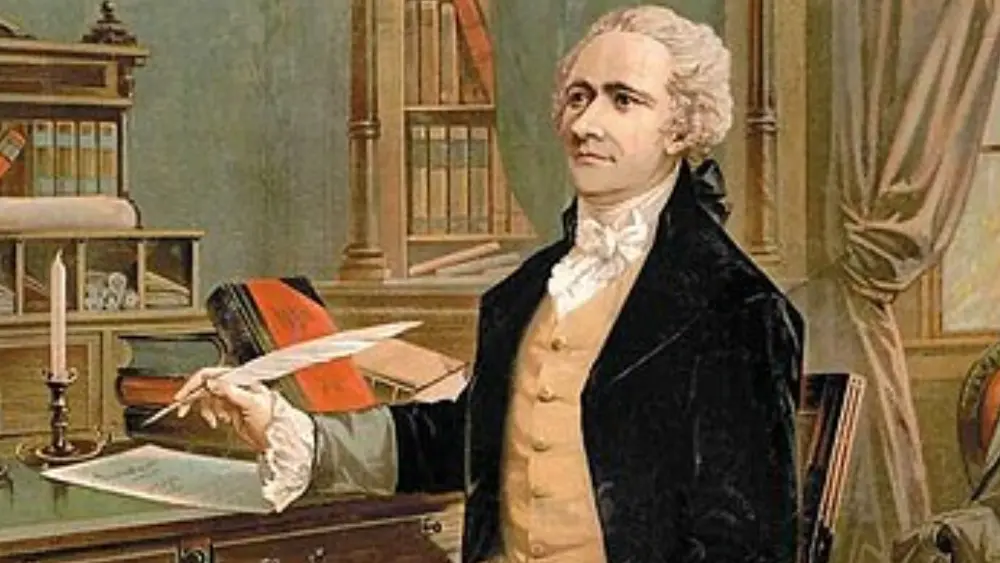Alexander Hamilton: Founding Father and Visionary
Alexander Hamilton, born on January 11, 1755 (or 1757, exact date debated), in Charlestown, the island of Nevis, was one of the Founding Fathers of the United States. His remarkable life, marked by intellect, ambition, and vision, played a pivotal role in shaping the early republic.
Early Life and Education
Alexander Hamilton’s early life was a testament to resilience in the face of adversity. Born in the West Indies to a Scottish father and a British mother, Hamilton’s illegitimate birth foreshadowed his future challenges. His mother’s early death left him orphaned, vulnerable to life’s hardships, and facing the tragic loss of parental support.
Despite these early setbacks, Hamilton’s extraordinary intellect and unyielding ambition propelled him towards greatness. His quest for knowledge led him to New York City, where he embarked on a transformative educational journey. At King’s College, which is known today as Columbia University, Hamilton’s thirst for knowledge was unquenchable. His voracious reading and insatiable intellectual curiosity laid the foundation for his future contributions to American politics and economics. In NYC’s formative years, Hamilton’s seeds of a remarkable career were sown, shaping American history’s future course.
Alexander Hamilton’s life story is a compelling reminder that adversity can be a catalyst for greatness. His early struggles did not deter him but instead fueled his determination to rise above his circumstances. Through education and intellect, Hamilton paved a path to become a key figure in the US founding, leaving a lasting impact.
Alexander Hamilton: American Revolution and Military Service
The eruption of the American Revolution marked a pivotal moment in Alexander Hamilton’s life. Eager to contribute to the cause of independence, he enlisted in the Continental Army, initially serving as an artillery captain. His choice to join the fight showcased his unwavering commitment to liberty and self-determination principles at the revolution’s core.
Hamilton’s rapid ascent through the military ranks showcased his exceptional abilities. He emerged as a vital figure within the American forces, ultimately becoming General George Washington’s trusted aide-de-camp. Hamilton’s close ties with Washington provided valuable leadership experience, strategy insight, and a lasting bond between the two. Their Revolutionary War collaboration shaped Hamilton’s political career, marking a crucial chapter in his life’s trajectory.
Hamilton’s military service in the American Revolution showcased his dedication to independence and shaped his influential role in the government. Battlefield lessons and connection to Washington influenced his political views and pivotal role in founding the United States.
The Federalist Papers
Alexander Hamilton’s enduring legacy is often closely tied to his pivotal role in crafting “The Federalist Papers.” These collaborative essays, with James Madison and John Jay, showcase their intellect and commitment to American governance remarkably. During a critical juncture in American history, authors wrote 85 essays to persuade the states to ratify the newly proposed United States Constitution.
The Federalist Papers served as a compelling and cogent argument in favor of the Constitution. Hamilton, Madison, and Jay meticulously articulated the need for a strong, centralized government that could effectively address the nation’s challenges while preserving individual liberties. Their writings, published in newspapers across the states, played a pivotal role in shaping public opinion and garnering support for the Constitution’s ratification.
In essence, “The Federalist Papers” represent a remarkable intellectual achievement, offering profound insights into the framers’ vision for the United States and providing a blueprint for the nation’s future. Hamilton’s contributions to this collection underscore his remarkable capacity for political and philosophical discourse and cement his status as one of the foremost architects of the American republic.
Alexander Hamilton: Secretary of the Treasury
In the early days of the United States, Alexander Hamilton took on the monumental task of becoming the inaugural Secretary of the Treasury in 1789 under the leadership of President George Washington. Moreover, in this critical role, Hamilton embarked on a transformative journey to shape the nation’s financial system. His vision was nothing short of revolutionary, aimed at stabilizing the fragile economic state of the young republic and setting it on a path toward prosperity and global prominence.
Hamilton’s financial policies were nothing short of groundbreaking. He advocated a national bank, a cornerstone of his economic strategy for financial stability and facilitating growth in the nation. Additionally, he championed the federal assumption of state debts, a move that strengthened bonds with states and enhanced the nation’s credit. His support for industry, tariffs, and subsidies laid the groundwork for a thriving American economy, fostering growth and prosperity. Hamilton’s economic program rescued the nation from turmoil and set it on the path to becoming a global economic powerhouse.
Alexander Hamilton’s time as Secretary of the Treasury completely transformed the United States. By the time he stepped down in 1795, he had done far more than just balance the nation’s books—he had laid the foundation for a thriving economy. His vision and policies not only stabilized the country’s finances but also set the stage for the US to become a powerful player on the world’s economic stage, securing its future prosperity.
Founding the U.S. Coast Guard
Among Alexander Hamilton’s lesser-known yet profoundly impactful contributions to the early United States was his instrumental role in the establishment of the United States Revenue Cutter Service in 1790. This service, which would later evolve into the U.S. Coast Guard, would come to play a crucial role in safeguarding American interests and maritime security.
Hamilton’s vision for the Revenue Cutter Service was rooted in the need to protect and regulate trade, a vital component of the nation’s economy at the time. Under his guidance, a fleet of revenue cutters was deployed to patrol American waters, enforce customs laws, combat smuggling, and ensure the safety of maritime commerce. This foresighted initiative was not only essential for revenue collection but also for asserting American authority and sovereignty along its coastlines.
The legacy of Hamilton’s efforts in founding the U.S. Coast Guard endures to this day. The service he helped create has evolved into a multifaceted agency responsible for a wide range of maritime missions, including search and rescue, environmental protection, and national defense. It highlights Hamilton’s ability to recognize and tackle the urgent needs of a growing nation. His impact extended beyond his well-known contributions to the economy and government. Hamilton’s role in establishing the U.S. Coast Guard underscores his enduring influence on the institutions that have shaped and continue to protect the United States.

Alexander Hamilton: Legacy and Influence
Alexander Hamilton’s legacy stands as a towering testament to his profound influence on the United States. Additionally, his visionary economic policies as the first Secretary of the Treasury were instrumental in shaping the nation’s prosperity. Hamilton’s support for a strong federal government and a national bank unified the new states into a powerful nation.
Hamilton’s influence on American government and economics is still felt today. He also envisioned a thriving, diverse economy built on strong financial institutions, setting the stage for the nation’s long-term prosperity. His push for a powerful central government and economic expansion helped shape the federal system as we know it. This lasting legacy continues to guide the country today.
The Broadway musical “Hamilton,” which gained widespread acclaim and popularity, brought renewed attention to Alexander Hamilton’s remarkable life and contributions. Through its artistry, it showcased the enduring relevance of his ideas and the enduring legacy he left behind. Hamilton’s lasting impact on American governance and economics serves as a constant reminder of his enduring influence on the nation.










